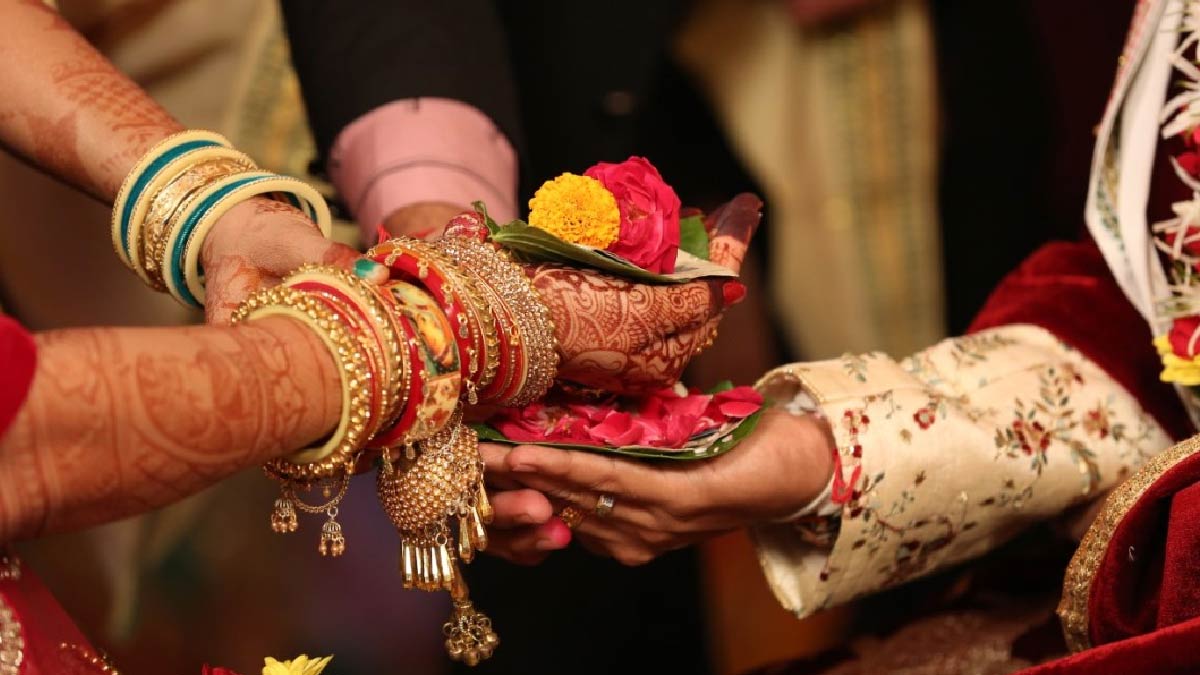
Indian weddings are often perceived as extravagant affairs akin to fairy tales. Once you're part of one, you might start questioning some of our traditions, especially ones like 'Kanyadan' which can be scrutinised for their perceived antiquity and gender bias. Despite its traditional significance in Hindu marriages, 'Kanyadan' has faced criticism for its regressive nature. However, a recent game-changing ruling by the Allahabad High Court brings hope for change.
Kanyadan is a traditional Indian wedding ritual where the bride's father grants formal approval for his daughter's marriage to the groom. This ceremony involves the father pouring sacred water into his daughter's hand and placing her hand in the groom's hand, symbolising the transfer of his daughter's guardianship to the groom. It is thought to enhance the parents' honour and cleanse them of any wrongdoing.
The Allahabad High Court recently ruled that the traditional ritual of Kanyadan is not mandatory for a Hindu marriage under the Hindu Marriage Act. This decision came during a case where a person, Ashutosh Yadav, was contesting a court's decision to reject his plea to recall witnesses in a trial, as per a report by Live Law.
Yadav's argument was based on contradictions in the statements of the witnesses, particularly about whether the Kanyadan ritual was performed during the marriage. However, the High Court disagreed, stating that discrepancies in witness statements alone were not sufficient reason to recall them.
The court clarified that the Hindu Marriage Act only requires the performance of the 'saptpadi' ceremony (saat phere) for a Hindu marriage, not the Kanyadan ritual. Therefore, the court concluded that recalling witnesses to prove the performance of Kanyadan was unnecessary for the case's fair decision.
In simpler terms, the court's ruling suggests that while Kanyadan is a common tradition, it is not legally required for a Hindu marriage to be considered valid under the law.
Siddharth Chandrashekhar, Advocate, and Legal Counsel told us that “The term 'Kanyadan' is not explicitly mentioned anywhere in the Hindu Marriage Act.”
Section 7 of the Hindu Marriage Act reads as under:
(1) A Hindu marriage may be solemnised in accordance with the customary rites and ceremonies of either party thereto.
(2) When rites and ceremonies such as the saptpadi, which involves the bridegroom and the bride taking seven steps together before the sacred fire, are performed, the marriage is considered complete and legally binding upon the completion of the seventh step.
Bollywood actress Dia Mirza made headlines when she broke tradition by opting out of certain customs at her wedding. She chose a female priest and rejected the ritual of Kanyadan, aiming for equality. This sparked a wave of discussions about women making similar choices.
Actress Alia Bhatt also questioned the tradition of Kanyadan in a bridal ad for Mohey, which faced backlash on social media. This raises the question: why should a woman start a new chapter in her life with a ritual she finds demeaning?
Don't Miss: Bengaluru Woman's Cry For Help As Bikers Chase Her Car Sheds Light On Long-Standing Issue Of Women's Safety
The idea of a woman being "given away" by her father to her future husband is seen as misogynistic. While fathers are significant influences in their daughters' lives, they do not have the right to give them away.
Another perplexing aspect is the belief that performing Kanyadan will elevate the parents' status and absolve them of sins, allowing them to attain heaven. How can giving away a daughter, whom they have nurtured with love and care, erase their sins?

We spoke to Siddharth Chandrashekhar, Advocate and Legal Counsel, Bombay High Court to express his opinion on the matter and he said, “In the 21st century, discussions revolve around equal rights, including the rights of girls to education and women to inherit family property. However, how often do we address the root cause of inequality and strive to establish equilibrium at a fundamental level? How frequently do we target the underlying factors that perpetuate inequality?”
The role of women has undergone remarkable changes in recent times. Women today are educated, self-sufficient, and financially independent. They excel in various fields, including sports, politics, and academics, and contribute significantly to society. For decades, women have strived to break free from the perception of being the weaker gender and have become an integral part of the community, no longer dependant on others.
Given these advancements, the continued practise of rituals like Kanyadan raises questions. Why should women, who have achieved so much and are capable of making their own choices, adhere to traditions that may seem outdated and restrictive?
The recent ruling by the Allahabad High Court stating that 'Kanyadan' is not essential for the solemnisation of a Hindu marriage offers hope. It signifies a step towards a future where women's choices are not seen as radical or feminist, but simply as their right to live life on their terms. This recent statement by the Allahabad High Court reflects a more inclusive approach, potentially breaking barriers and promoting equality in marital practises.
Keep reading Herzindagi for more such stories.
Credits: Freepik
Also watch this video
Herzindagi video
Our aim is to provide accurate, safe and expert verified information through our articles and social media handles. The remedies, advice and tips mentioned here are for general information only. Please consult your expert before trying any kind of health, beauty, life hacks or astrology related tips. For any feedback or complaint, contact us at [email protected].